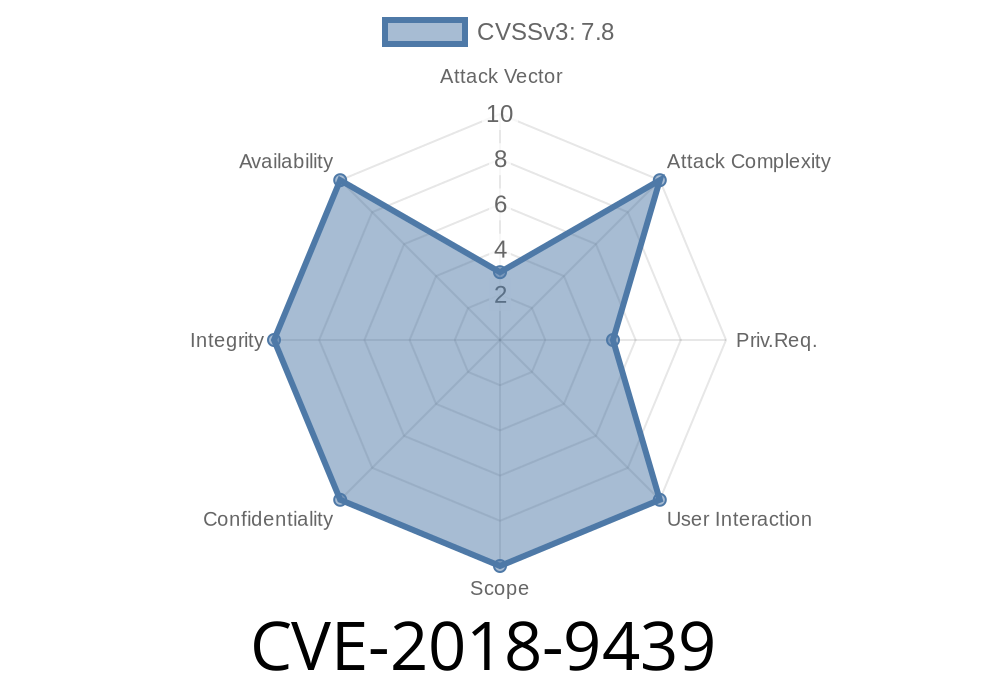The Linux kernel is the backbone of millions of systems — powering everything from smartphones running Android to servers and desktops. But even the most robust code isn't immune to subtle bugs. One such flaw was discovered in af_packet.c, affecting Android and various Linux distributions: CVE-2018-9439. Let's dig deep into this vulnerability, see example code snippets, find out how attackers can use it, and explore the core problem with simple language.
What is CVE-2018-9439?
CVE-2018-9439 is a use-after-free bug in the kernel's networking subsystem — specifically in the AF_PACKET protocol. It happens in the functions __unregister_prot_hook() and packet_release() located in net/packet/af_packet.c.
The root cause? The lack of proper locking during object release. As a result, a malicious local user with a regular application process can sometimes trick the kernel into using memory after it was freed. That opens the door to privilege escalation — potentially letting bad actors run code with *system-level* permissions.
No user interaction required. You just need a shell or running process and a vulnerable kernel.
The simplified code below (from kernel 4.9.x) shows how po->rollover can trigger a use-after-free
/* Simplified snippet from af_packet.c */
static int packet_release(struct socket *sock)
{
struct sock *sk = sock->sk;
struct packet_sock *po = pkt_sk(sk);
spin_lock(&po->bind_lock);
/* ... other cleanup ... */
po->rollover = NULL; // <-- Memory will be freed later
spin_unlock(&po->bind_lock);
/* Somewhere below, __unregister_prot_hook can be called... */
}
The function releases (frees) the memory for po, but unlocking happens too early. If another thread sneaks in after the unlock but before all uses are done, it might use the already-freed memory. That is *unsafe*.
Attack Vector: Local user creates and manipulates AF_PACKET sockets (raw packet sockets).
- Goal: Trigger concurrent access to packet_release() and __unregister_prot_hook() to cause a use-after-free.
- Impact: Arbitrary code execution in the kernel. Local privilege escalation — get root from user context.
Here’s a high-level example (not a crash-your-PC PoC!) of how one could trigger this bug
#include <sys/socket.h>
#include <linux/if_packet.h>
#include <pthread.h>
int sock;
void* close_sock(void* arg) {
close(sock);
return NULL;
}
int main() {
sock = socket(AF_PACKET, SOCK_RAW, htons(ETH_P_ALL));
// Race: close socket from another thread
pthread_t t;
pthread_create(&t, NULL, close_sock, NULL);
// Rapidly configure/dismantle the socket in main thread
while (1) {
// bind/setsockopt operations on sock...
}
pthread_join(t, NULL);
return ;
}
*Note: This is a simplified sketch; crafting a real exploit requires precise timing and kernel memory knowledge.*
Official Android Advisory:
Android Security Bulletin—December 2018
Upstream Patch:
net/packet: fix use-after-free in packet_set_ring
Security Tracker:
Linux Kernel Patch Discussion:
LKML: Eric Dumazet: "packet: handle too big packets properly"
Simple Explanation
Imagine you are closing a book and someone tries to read one last page right as you close it — sometimes before, sometimes after. If the timing is off, someone could see garbage or, worse, something left from another story. In coding, that's what a use-after-free is: one thread has said "done with this!", but the other isn't done yet.
Risk Assessment
- Who is at risk? Systems running unpatched Linux kernels or Android versions before the December 2018 patch.
Attack prerequisites: Local user account. No need for physical access or tricking a user.
- Why is this dangerous? Local attackers — or malware — can chain this to break out of sandboxes or gain root.
Conclusion
CVE-2018-9439 is a technical flaw, but with clear risks for real-world Linux and Android systems. It's a great example of how complex kernel synchronization bugs turn into security vulnerabilities, and why regular patches are essential.
Keep your systems updated and restrict dangerous privileges — especially for networking operations!
Timeline
Published on: 12/05/2024 00:15:18 UTC
Last modified on: 12/05/2024 16:15:19 UTC
